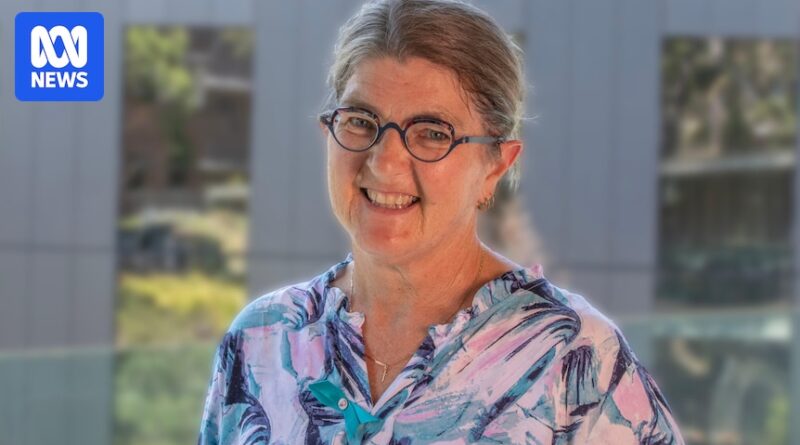Gynaecological cancer survivors help educate Australia’s future doctors and nurses
When Kristin Young was diagnosed with stage 3 ovarian cancer in 2009, it had taken her doctors some time to figure out what was wrong.
“Ovarian cancer is difficult to pick up and often thought to be other things,” she said.
“The most common symptoms — bloating, feeling full [quickly] and the need to urinate more often … they present like other common conditions.”
In Kristin’s case, it was a much rarer symptom — swollen lymph nodes in her groin — that prompted concern.
Kristin Young is an ovarian cancer survivor and a volunteer for Survivors Teaching Students.
(Supplied)
“The really tricky thing about ovarian cancer is it manifests in many different ways … and spreads quite widely before it ever gets big enough to give you a symptom,” she said.
“Many women have hoped that the medical system would do better to pick it up early, but the system is up against the perplexing biology of ovarian cancer, which is worsened by its rarity.”
Kristin underwent treatment, which was successful, but 4.5 years later, the cancer returned.
The now-retired psychologist said one of the biggest challenges of dealing with a cancer diagnosis was navigating the health system and “getting the right communication” with her medical team.
“It is challenging for patients to get the best out of the medical system, so it became very important to me to try to optimise that communication,”
she said.
When an opportunity came up to work with trainee health professionals to improve their understanding of gynaecological patients’ lived experiences, Kristin knew she wanted to be involved.
“One of the really important things … is to share that message that [ovarian cancer] is difficult to diagnose, and how important it is to listen to the stories that women bring to the doctor,” she said.
“If, through education and awareness, we can help a small number of people be diagnosed even a bit earlier, it’s better than things staying the way they are.”
Gynaecological cancers poorly understood
The volunteer-led program, Survivors Teaching Students, is a national initiative that brings ovarian and other gynaecological cancer survivors and caregivers into the classrooms of medical, nursing and other health professional students across the country.
Alison Evans, CEO of the Australian and New Zealand Gynaecological Oncology Group (ANZGOG), said the program was developed by the Ovarian Cancer Research Alliance in the US and brought to Australia by ANZGOG in 2017.
“It’s vital because it’s really giving voice to what symptoms are, what diagnosis looks like, and what treatment looks like from a patient’s perspective,” Ms Evans told the Health Report.
Loading…
In Australia, 19 women are diagnosed and six women die from gynaecological cancer every day.
Despite this, Ms Evans said gynaecological cancers — which include uterine, endometrial, ovarian, vulval, vaginal and cervical — were poorly understood in the community.
“There’s a stigma around these cancers because they are part of the reproductive system, and therefore they’re hidden and they’re very personal,” she said.
With the exception of cervical screening, there are no early detection tests available, and as a result, gynaecological cancers often grow silently during the curable stage.
More than 100 volunteers currently participate in the Survivors Teaching Students program across Australia and New Zealand. (Supplied: ANZGOG)
Adding to the challenge is the fact women may have symptoms overlooked or minimised by health professionals, which Ms Evans hopes the program will help to change.
“We ask women to know their body and to advocate for their body … it is vital that they are listened to and that doctors hear what these women are saying to them.“
Shining a light on the patient experience
Since 2017, Survivors Teaching Students volunteers have delivered in-person and online programs to more than 20,000 students across 22 universities in Australia and New Zealand.
During a typical session, students hear from three volunteers — including patients, carers and family members — about their personal experience with gynaecological cancer, including the physical, mental and emotional toll it takes.
“Patients are real people with lives and families, and we want the doctors and nurses of the future to see that,” Kristin said.
One of the key goals, she said, is to emphasise the importance of good health communication and compassionate care.
“Patients remember what doctors and nurses say, and that sometimes can be engraved in your mind forever.”
But the most important part, according to Kristin, is answering the questions from students.
“Many students are really touched at an emotional level … and perhaps start to think they would consider a career in oncology or oncology-based research.”
Like many women with gynaecological cancer, Kristin Young experienced delays in getting a diagnosis. (Supplied)
Further research was critical for early detection and treatment options to be improved, Ms Evans said, particularly for the 55 per cent of gynaecological cancers considered rare or less common, which often had limited treatment options.
“We want doctors to be curious about these diseases for the rest of their career,” she said.
“The most important thing is that GPs and nurses … have a voice in their head that is the woman’s voice or the carer’s voice that they take with them.”
Leaving a lasting legacy
Kristin said her own experience with ovarian cancer was proof that oncology research was having an impact.
“I’m a ‘super responder’ on one of these new molecular-based treatments … so the prognosis that I had, which was very poor, I have now outlived this, and I know that that represents hope,” she said.
“Research is prolonging lives in some people and with more research it will prolong more lives.”
In addition to inspiring and educating the next generation of health professionals, she said the Survivors Teaching Students program had strengthened the community of people living with gynaecological cancer.
“At the very personal level, I have made good friends, what I feel are lifelong friends.
“The term lifelong is ironic in ovarian cancer because many of the women I have met … unfortunately have not had long lives. I have my contacts list and my phone is full of people who have passed away, but I never delete them.”
The program helped people affected by gynaecological cancer leave a “lasting legacy”, Ms Evans added.
“Many women and their families at the end of treatment are looking for a way to make a difference.
“It gives people a sense that they could take their experience of this disease and turn it into something good.“
Listen to the full story and subscribe to the Health Report podcast for more.





